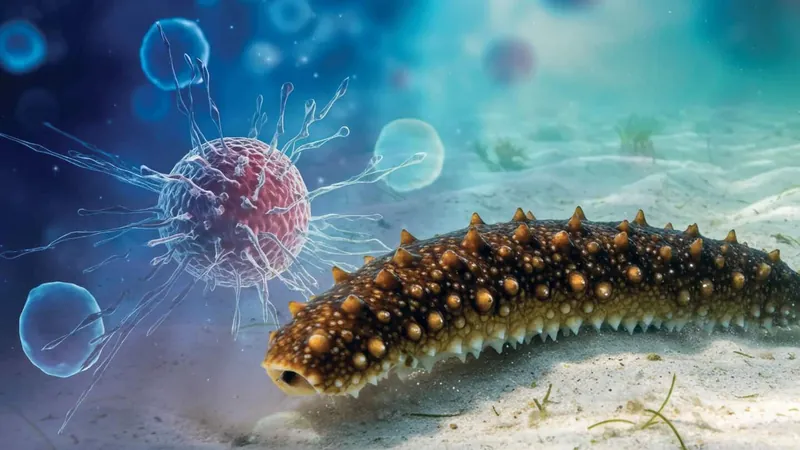
Unlocking the Secrets of the Sea: How Sea Cucumbers Could Halt Cancer's Spread
2025-06-21
Author: Arjun
Revolutionary Discovery in Cancer Treatment
A groundbreaking study from the University of Mississippi reveals that sea cucumbers could hold the key to stopping cancer in its tracks. Researchers have identified a rare sugar compound in these marine creatures that shows promise in preventing the spread of cancer without the harsh side effects associated with traditional therapies.
The Power of Fucosylated Chondroitin Sulfate
The compound at the center of this discovery is fucosylated chondroitin sulfate, extracted from the Holothuria floridana sea cucumber. This remarkable sugar works by blocking Sulf-2, an enzyme that allows cancer cells to proliferate. Dr. Vitor Pomin, an associate professor at the University of Mississippi, explains, "This sugar effectively halts the pruning of the cellular 'forest', inhibiting cancer's ability to spread."
Marine Magic: Unique Compounds with Medical Potential
Lead researcher Marwa Farrag points out the exceptional properties of marine-derived compounds. She notes, "Marine life produces structures that are often rare or absent in land animals," which makes these sugars a valuable focus for medical research.
Cutting Off Cancer's Path
Sulf-2 plays a critical role in altering glycans—sugar molecules that facilitate communication between cells and engage the immune system. When Sulf-2 modifies these glycans, it enables cancer cells to detach and metastasize. By inhibiting this enzyme, the researchers aim to curb tumor invasion into healthy tissues.
A Safer Alternative
One major advantage of this sugar compound is its safety profile. Unlike other Sulf-2 inhibitors, fucosylated chondroitin sulfate does not affect blood clotting, reducing the risk of severe bleeding—an important consideration for cancer treatments, as noted by Dr. Joshua Sharp.
Challenges Ahead: From Sea to Pharmacy
While the findings are promising, researchers face hurdles in mass-producing this compound, as its yield from natural sources is low. Dr. Pomin highlights the need for developing synthetic methods to produce these sugars in larger quantities. The team is currently synthesizing the compound in the lab, aiming for preliminary tests on animal models.
A Bright Future for Cancer Therapy?
This innovative research not only underscores the potential of sea cucumbers in modern medicine but also opens up new avenues for cleaner, safer cancer treatments derived from nature's depths. As scientists continue to explore the healing properties of marine life, we could be on the brink of a revolutionary change in how we battle cancer.


 Brasil (PT)
Brasil (PT)
 Canada (EN)
Canada (EN)
 Chile (ES)
Chile (ES)
 Česko (CS)
Česko (CS)
 대한민국 (KO)
대한민국 (KO)
 España (ES)
España (ES)
 France (FR)
France (FR)
 Hong Kong (EN)
Hong Kong (EN)
 Italia (IT)
Italia (IT)
 日本 (JA)
日本 (JA)
 Magyarország (HU)
Magyarország (HU)
 Norge (NO)
Norge (NO)
 Polska (PL)
Polska (PL)
 Schweiz (DE)
Schweiz (DE)
 Singapore (EN)
Singapore (EN)
 Sverige (SV)
Sverige (SV)
 Suomi (FI)
Suomi (FI)
 Türkiye (TR)
Türkiye (TR)
 الإمارات العربية المتحدة (AR)
الإمارات العربية المتحدة (AR)